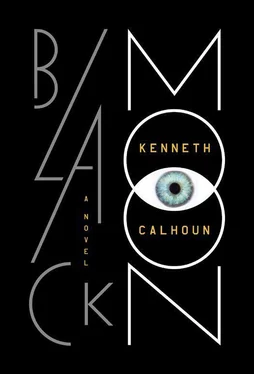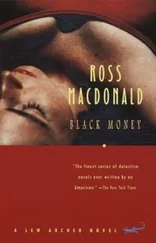Minutes later, she was picking through the elaborate array of trip wires she had woven across the staircase earlier. The twine, pulled tight and weighted with bells and empty cans, formed an ornamented cat’s cradle that even she, with her careful movements and knowledge of the pattern, couldn’t negotiate without triggering a rattle of empties. It’s not like Felicia would be bothered by it, dead to the world up in the room with the wind shaking the window glass. But that’s no reason to tear it down and then have to redo it all when she came back, she figured.
The wind was roaming the neighborhood, shaking the trees and herding the loose trash down the street, pinning papers against fences and garage doors. It came in blasts, tugging at the owl mask on her head. It seemed determined to expose her. She held the mask down with one hand, the other clasping the flashlight. Through the mesh she could see the moon, now much lower in the sky. There were no clouds and the stars blazed. They hung low in the smogless sky. Close enough, Lila thought, to be blown out like birthday candles. This was the wind that had inspired area founders to plant rows of eucalyptus trees along the edge of their citrus groves—windbreaks to protect the crop. This was the wind that had knocked her ailing grandmother down one Christmas as she exited her old Cadillac, unsteady from the chemo, like a kite in her big coat. The wind tried to carry her away.
She studied the dark street for movement without turning on her light. The many For Sale signs swayed and turned in the wind. Storms of litter blew through, making it hard to see. People wandered the streets at all hours now, no longer following the pattern dictated by the sun and the moon and the turning of the earth. Yet other than those objects—trees, bushes, loose debris—animated by the wind, there was no sign of life up and down the street. She moved into it, twisting her entire body left to right in order to see out the mesh openings in the mask. The chimes rang out when the wind rushed through, allowing her to slowly zero in on the sound.
Trash churned around her, sticking to her mask, as the wind led her down the street and through the yards of two back-to-back houses, so that she emerged on the neighboring street. The houses were identical to those on the street she had just left—a mix of single- and two-story ranch-style homes. Steep driveways and two-car garages. Once-landscaped yards now cluttered with junk, the gutters bone dry.
The wind hit a lull so she had to stand in the street and wait, not sure which direction to go. When it picked up again, the chimes rang sharply to her right, like sparks of sound. She went to it and found herself in someone’s backyard, staring up at a second floor balcony. She could make out the general shape and movement of the chimes, which had been suspended from the corner. They shivered and danced as the wind rose and fell.
But something dark—two black forms—swayed next to the source of the sound. She heard the creak of the balcony railing as the shapes were slowly turned by the wind. A sweep of the light revealed what she already sensed. Bodies. One, a man. The other appeared to be a large dog. Hanging side by side as the chimes spun and stirred in their faces—producing a sound they must have carried into death as they kicked and jerked from the choke-chain collars that had cinched shut their windpipes.
Lila looked up at them. She had seen many bodies over the last month, but she had yet to become desensitized. The sight of the dead triggered a strange reaction in her: a coppery taste in her mouth. It made her resist swallowing, and the saliva accumulated in her mouth. She had to raise the mask, wiping her mouth with the back of her hand after sloppily spitting. The fear triggered by the sight above her was of the cold and sickly variety, like a large slug boring through her chest. She choked back the nausea produced by its slow undulations.
Still, she wanted those chimes.
She would have to go through the house to get them. The sliding glass door that opened to the patio was closed, but not locked. She slid it open and peered into the dark space. The void held patches of darkness. She clicked on the flashlight and put her hand over it, not wanting to signal her position should anyone be around. Her palm was illuminated, a ring of red flesh, until she pulled her hand away, allowing the light to stab forward and paint the scene.
Furniture piled up, an exercise bike on its side, a birdcage with a dead parrot inside. She noted a path through the clutter and put her hand back over the light. The wind shook the dark shelter around her.
In this way, she moved through the house, slowly navigating the carpeted stairs with flashes of light, passing down the hallway of bedrooms to the door at the end. There she entered the master bedroom, with its narrow balcony.
At the sliding door, she was hit with a blast of air. It blew through the gaping opening with a rumbling fury. The curtains whipped around, snapping at her. She dipped her head and stepped out, leading with the mask like a helmet. A heavy wrought iron table was pinned against the railing. The leashes had been cinched to its legs, so that it served as an anchor. The railing groaned as the wind swung the bodies hanging beyond view. Lila avoided looking down at them. She reached down through the railing on the side of the balcony, feeling the air for the chimes. But she retracted her hand, suddenly overwhelmed by the feeling that someone, or something, would grab hold of it.
The wind blew and the chimes rang below her.
She shook off the thought. Nothing’s going to happen! Just grab it and get out of here. Again, she reached through. She pushed into the railing so that the mask pressed up against her face as her hand felt at the air. It fluttered in space as if waving to someone below, until her fingers hooked the line and she was able to bring up the chimes, landing them like a fish pulled from the water. They went silent against the slat floor.
She quickly retraced her steps through the house, chimes held tightly in one hand, flashlight in the other. Once outside, she crouched at the edge of the backyard, again looking for human movement. The wind surged in a massive gust. She heard the snap of tree limbs and the clatter of tiles torn free. Dirt blasted up from the ground, but it was screened by the mesh before her eyes. She stood and walked the length of the side yard, holding the mask down, then passed through the yard of the house to the rear. Toppled trash bins slowed her progress. She made her way to the street, where she studied the row of identical structures, looking for the house where she had left Felicia. She strained to make sense of the scene, which had been sifted by the wind. The FOR SALE signs were no longer standing and the loose debris had been violently rearranged.
But before she could recognize that she was still a street away—having forgotten that she had crossed two streets earlier—she heard another chime. The wind carried the sound to her from down the street. She hesitated. But why not? She still wasn’t sleepy. And a night like this, with all this wind, is the best time to gather up more noisy things.
She started down the street. She kicked away papers that the wind attached to her legs and peeled them off her chest—shreds of newspaper, magazines, ads. Boxes were blown along like tumbleweeds. The feeble parkway trees bowed in the face of the explosive gale.
This time the chimes were hanging from a rafter on the front porch of a house that at first glance she believed was the very house with Felicia inside. But she would have noticed the chimes earlier. And the olive tree out front didn’t seem tall enough. It wasn’t even an olive tree, was it? There was no FOR SALE sign either.
Before she was even able to drag a patio chair under the chimes and lift them off a nail, she heard another ringing out nearby.
Читать дальше












